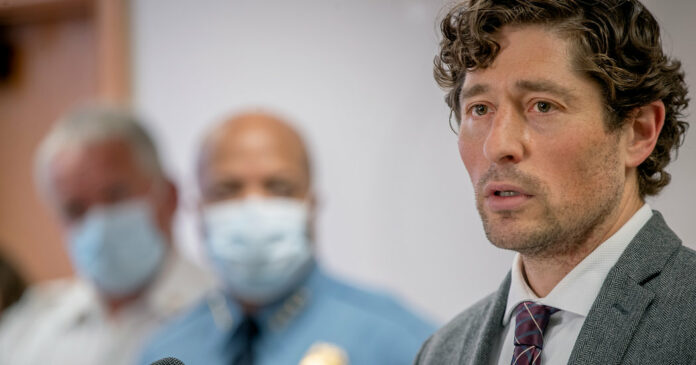The mayor took the helm of the city after fatal police shootings hampered his predecessor.

Mayor Jacob Frey of Minneapolis, a 38-year-old civil rights lawyer, swept into office in 2018 on promises to fix the broken relationship between the community and the police in the wake of two fatal police shootings. It would start, he said, with residents getting to know their local police officers personally.
“I want people to know that their officer on Mondays, Tuesday and Fridays from 4 p.m. to 10 p.m. is Jenny,” he told voters the day after his election. “I want you to know Jenny. I want you to know her by name.”
But now, trust in the city’s police force has reached a new nadir after a video circulated showing the death of George Floyd, a black man who died after a white police officer held his knee on Mr. Floyd’s neck for several minutes. The video led to days of protests, and on Thursday night, a police station was set ablaze.
After Mr. Floyd’s death, Mr. Frey took the unusual step of bluntly criticizing the actions of the police officers on social media before an investigation had been completed.
“Being black in America should not be a death sentence,” Mr. Frey said at a news conference on Tuesday. “I believe what I saw and what I saw is wrong on every level.”
Four officers were fired, and on Friday afternoon, Derek Chauvin, the former officer who pinned Mr. Floyd down, was arrested on charges of third-degree murder and second-degree manslaughter.
On Thursday afternoon, Mr. Frey pleaded with protesters to return to their homes so the community could work together to rebuild a more just society.
“We need to offer the radical love and compassion we all have in us,” he said on Twitter. “We must restore peace so we can do this hard work together.”
But anger continued to mount. By the wee hours of Friday morning, as the police station was in flames, Mr. Frey’s appeals for public safety had become increasingly urgent.
“Right now working together means clearing the area,” he said on Twitter.
Mr. Frey is a Northern Virginia native and former professional runner who fell in love with Minneapolis after running a marathon in the city. He moved there in 2009 and won a City Council seat in 2013.
Two years ago, he staked much of his campaign for mayor on his ability to reform the Police Department. His predecessor, Mayor Betsy Hodges, faced fierce criticism after two fatal police shootings: the 2015 killing of Jamar Clark, a black man who was accused of assaulting his girlfriend, and the 2017 killing of Justine Ruszczyk, a white woman who had called 911 to report hearing a scream.
After Mr. Clark was killed, protesters occupied the area around a police station for 18 days.
A jury convicted Mohamed Noor, the Somali-American police officer who shot Ms. Ruszczyk, of murder. He was the first Minnesota officer convicted in a fatal on-duty shooting in decades.
In 2019, the city paid a $20 million settlement in the wake of Ms. Ruszczyk’s death. Mr. Frey, who announced the settlement, said there had been no clear threat to Mr. Noor’s life before he fired his weapon.
“This is not a victory for anyone, but rather a way for our city to move forward,” Mr. Frey said.






